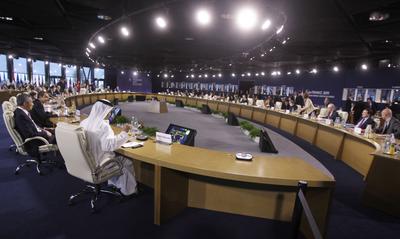Yet the renewed threat to recovery arising from the self-created problems of the US and EU has created an urgent demand for Asian leadership in 2011.
As in 2008, the world is looking to the G20 to deal with the renewed threat of recession.
The US and EU are certainly not going to boost global demand. Asian and other emerging economies have some scope to stimulate domestic demand, but not nearly as much as in 2008. By the time G20 leaders met in France in November 2011, the short-term prospect was, at best, to avoid recession in the US and EU.
Such an outcome may be adequate for one year but risks the future of the G20. Continued stagnation of mature economies will accelerate the ongoing shift of economic power and influence towards emerging economies. Economies with growing shares of wealth and dynamism will be blamed for not doing more. But aggressive attempts to attribute blame to dynamic economies, China in particular, just makes it politically harder for these economies to implement reforms.
To avoid falling into a swamp of unproductive recrimination, the G20 needs to find a strategy to stimulate effective demand which all its members can support.
At a time of deficient global demand, substantial savings generated by emerging economies are locked up in excessive foreign exchange reserves alongside vast potential for investment in economic infrastructure. Much of the vast unmet demand for infrastructure is in the emerging economies of Asia, which are also the source of much of these savings.
Asian governments have recognised the costs and risks of continuing to accumulate reserves. Those risks include significant capital losses, ongoing blame for inadequate global growth, and the costs of prolonged weak global demand on their own economies.
Now is a good time to address a global financial market failure in order to reduce these growing risks. Bringing forward some badly needed investments in infrastructure could be a decisive circuit-breaker to spark sustained global recovery.
Asian governments can put the challenge of fixing the current massive market failure squarely on the G20 agenda. A concerted effort by all members of the G20 to gradually make better use of Asia’s huge accumulated savings will allow them to work constructively to solve a shared policy problem, rather than blaming each other for there being too little growth and too many exports.
Channelling more of Asia’s savings into productive investment in infrastructure will not happen quickly or easily. G20 leaders can challenge their officials, financial-sector managers, and international financial institutions to use their expertise to find creative ways to intermediate savings to finance more investment in infrastructure.
The Asian Development Bank (ADB) and other multilateral development banks can step up their roles. They can be sound borrowers of Asian savings; they can invest them in productive projects, including projects to improve connectivity among economies. Commercial banks can also do more in credit-worthy emerging economies.
There will be some risks. One or two governments may act irresponsibly and make a mess of some investments. But, with care, most investments in infrastructure will prove to be viable. There is a lot of international experience on designing public-private partnerships and shaping policies to set prices and contain project risks within acceptable limits. And the risk of some projects being less successful than expected is far less than the risks of prolonged recession.
An effort to create more effective demand for investment will need to be accompanied by ongoing efforts to cope with long-term problems of debt in mature economies and structural adjustment in emerging economies. These complementary efforts can restore confidence in the world economy.
In the meantime, G20 leaders might delay thinking about other significant global problems. Unfortunately, the window of opportunity to avoid disastrous climate change is closing fast, and the future of an open non-discriminatory WTO-based regime for international commerce is being undermined by misplaced faith in preferential trade deals.
It will take a long time to find consensus on how to contain, let alone resolve, such problems. In a voluntary process of cooperation like the G20, there will be no big breakthroughs in any one year. It will not be possible to deal with these big problems in sequence. A more prudent option is to start a discussion of these issues in a patient, non-confrontational manner.
Right now, the US and EU are both caught in a vicious circle of acrimony and repeated attempts to defer hard decisions. They cannot be expected to lead the consensus-building needed to deal more adequately with global warming or rescue the WTO. Nor can Asian governments rely on them to deal wisely with global issues, respecting differences and searching for consensus rather than confrontation.
At a time of weak global governance the challenge of leadership is being thrust on Asia sooner than it had hoped.
The agenda of Asian institutions for regional cooperation can move beyond preoccupation with local issues and trade negotiations to an outward-looking effort to address important matters which require global solutions. Forums like ASEAN+3 and the East Asia Summit can be used to consult on how Asia can use the G20 opportunity — an opportunity which may not be repeated — to defend, then reform, the international economic order in ways needed to complete their emergence from poverty.
Andrew Elek is a Research Associate at the Crawford School of Economics and Government, the Australian National University.
This article was first published in the most recent edition of the East Asia Forum Quarterly, ‘Asia’s global impact’.

